
23 Jul 2021
Deep breath, attention, go! They’re off at the Tokyo Olympic rowing regatta
It’s all go – finally – at the Sea Forest Waterway in Tokyo for the 2020 Olympic rowing regatta. The global pandemic might have caused a delay, but it did not stop these athletes from pursuing their dream. They gave it their all in today’s heats.
The Sea Forest Waterway turned on flat water with a slight tail wind causing some small ripples. The day was already warm with temperatures due to peak in the low 30’s degrees Celsius.
Men’s single sculls (M1x) – Heats
Along with the women’s single, this boat class has the biggest field at the Olympic rowing regatta. With six heats lining up, the top three boats in each heat would get to go directly to the quarterfinals. Getting the Olympic regatta going was Heat One, which included Jan Fleissner of the Czech Republic, replacing Olympic medallist Ondrej Synek. But all eyes were on Kjetil Borch of Norway. Borch medalled at the Rio Olympics in the double, and then swapped to the single with much success. Borch was the first through the 500m marker, with Brazil’s Lucas Verthein Ferreira following closely along with Hungary’s Bendeguz Petervari-Molnar.
It already looked like the top three places had been established, but anything can happen in Olympic racing and especially with 1500m left to row. Borch continued to grow his lead, with Brazil getting a slight advantage over Hungary. Fleissner was in fourth and would have to really blast it to catch Hungary. Borch didn’t set out to break any records today, and looked relaxed as he finish in first. Petervari-Molnar pulled through into second with Ferreira holding third. Petervari-Molinar follows in his father’s footsteps as an Olympian.
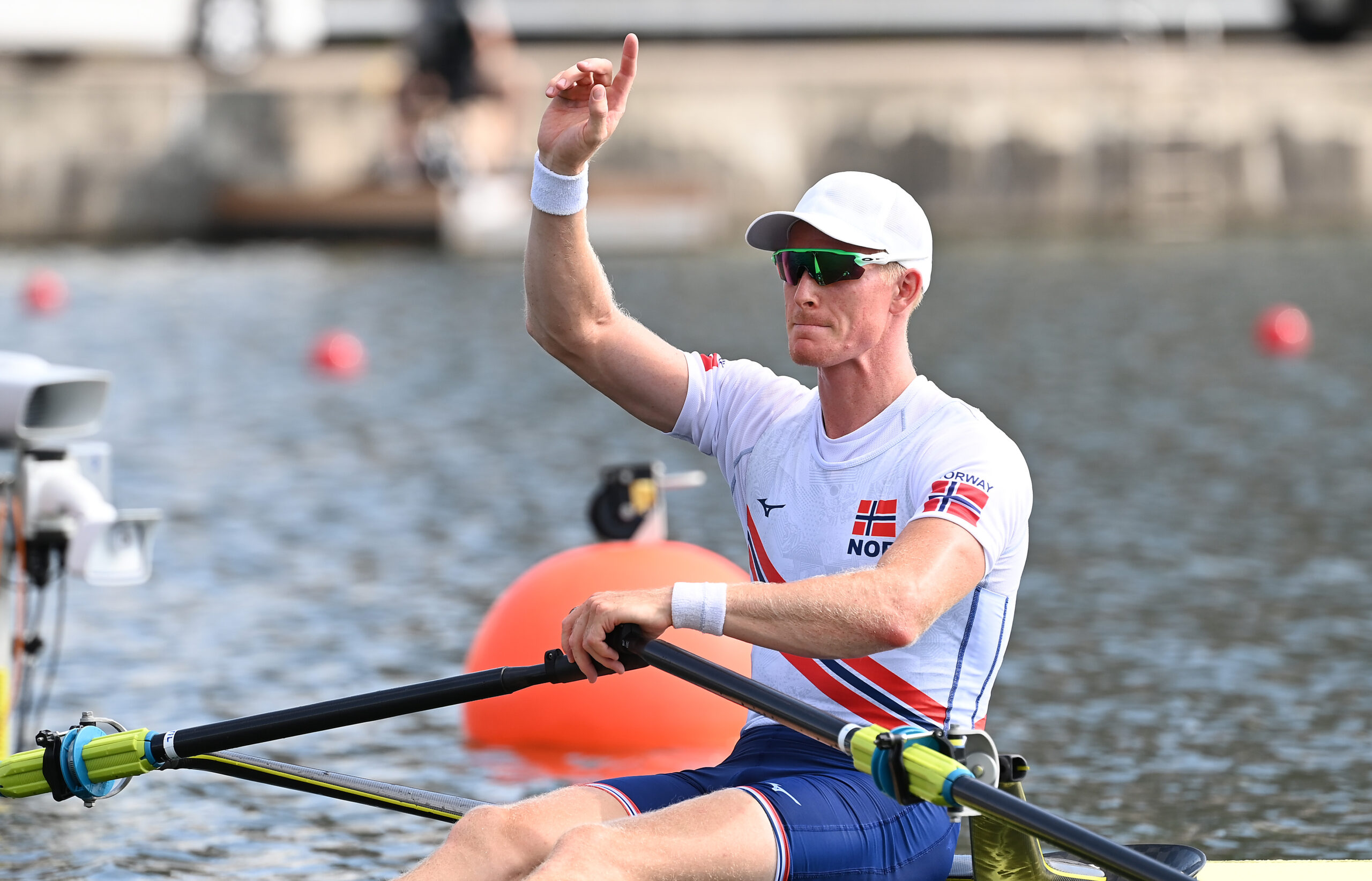
Heat Two was full of relative newcomers to top rowing and it saw a good start by Alvaro Torres Masias of Peru. Torres Masias trains in the United States. But it was Greece that got to the 500m mark first. Stefanos Ntouskos finished fourth at this year’s European Championships and is definitely a rower to watch. He went to the Rio Olympics in the lightweight four. Torres Masias and Ntouskos were the two boats at the head of the field going through the middle of the race with Jordan Parry of New Zealand back a bit in third. Ntouskos kept the pressure on and moved away from the Peruvian. This meant he didn’t need to sprint the finish. Parry was now going after Torres Masias. The New Zealander had done it, charging through into second.
There was no doubt about the favourite in Heat Three. Sverri Nielsen of Denmark has been around a while, but really found his stride in the single a couple of years ago. Nielsen edged out at the start with Zimbabwe’s Peter Purcell-Gilpin in hot pursuit. Purcell-Gilpin will carry his country’s flat at the opening ceremony tonight. Then Italy’s Gennaro Di Mauro moved up and overtook Zimbabwe, slowly closing in on Nielsen. It was impressive to see Di Mauro so close to the experienced Nielsen. At just 19 years old, Di Mauro has had very good results in the single this season. He was now in the lead. Nielsen didn’t like this and pushed back. Di Mauro, in his bucket hat, couldn’t hold the pace.
Nielsen moved out to an open water lead with 500m to row. Di Mauro looked to be buttoning off and saving himself. Zimbabwe meanwhile was under pressure from Kazakhstan. At the line, Nielsen was easily in front, Di Mauro held on to second with an oh-so-close finish of Kazakhstan’s Vladislav Yakovlev taking third over Zimbabwe.
What could Mindaugas Griskonis of Lithuania do? His experience is huge but lately he hasn’t spent so much time in the single. Griskonis lined up in Heat Four and got off the line the quickest, with Trevor Jones of Canada following in second. Jones comes to these Olympics through the Final Olympic Qualification Regatta in May. Jones then got in front going through the middle of the race with Turkey’s Onat Kazakli now just behind Griskonis in third. A very upright Jones continued to lead with Lithuania and Turkey firmly in the remaining qualifying spots. Griskonis kept the heat on Jones and coming into the final 250m it was a real battle with Griskonis hunting him down. This battle meant Kazakli got dropped. Jones took the challenge and moved away from Griskonis to win.
Heat Five had the Rio silver medallist, Damir Martin of Croatia sitting in an outside lane. Martin has had mixed results since Rio. Today he was in the lead at the start rating a very solid 38 and in no time at all Martin had an open water lead with just 500m raced. Benin was also off to a fast start but by 500m ROC followed in second with the Philippines in third behind Martin. Vyazovkin of ROC then got away from Nievarez of the Philippines. Nievarez is the first Olympic rower for the Philippines in a number of years and there’s been considerable local interest around him.
The race was now very spread out and it didn’t look like the order would change as Martin dropped down to 31 strokes per minute and cruised on through to the finish line. This will be a great confidence boost for Martin as he paddled home.
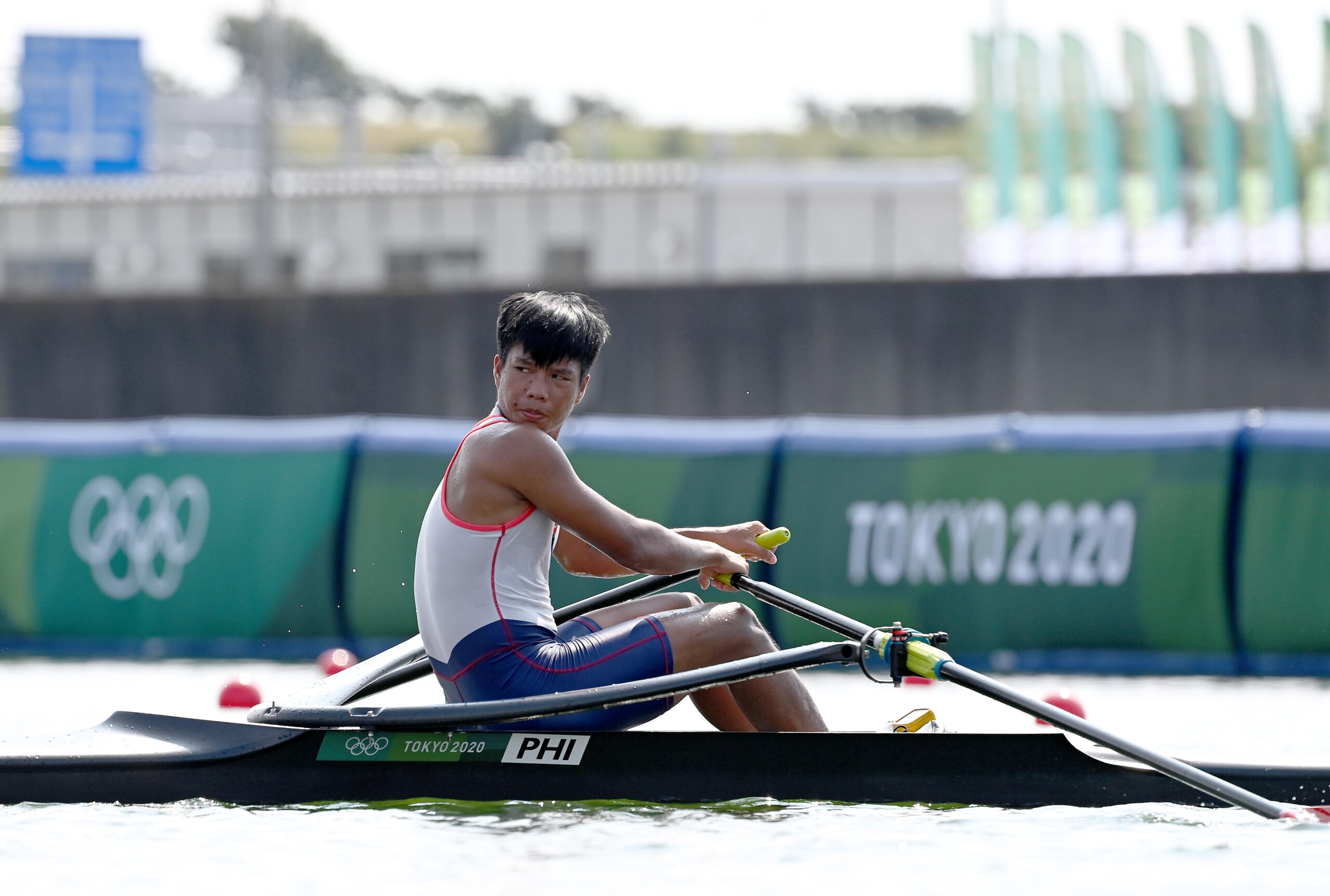
The last heat of this boat class, Heat Six had the reigning World and European Champion, Oliver Zeidler of Germany. The 23-year-old Zeidler is seen as being the one to win gold at this Olympic Games and he would want to make his mark on this heat. Zeidler went out at a 44 stroke rate pace with only Japan getting his boat above 40. Egypt had a good start with their athlete Abdelkhalek Elbana doing his best to hold on to Zeidler. The German got through the first 500m in the lead with Elbana in second and Ryuta Arakawa of Japan in third. Arakawa took up rowing at university and was doing great to be in third here today.
Zeidler now had an open water lead and he looked like he could hold this very steady pace through to the finish. Coming into the final 500 Arakawa and Elbana were neck-and-neck as Finn Florijn of the Netherlands now making his move. Elbana was under threat from Florijn who comes with a pedigree that includes his father being an Olympian. The cheers now went up for Arakawa as he tried to hold off Florijn. Arakawa was second at the line with Elbana also managing to hold off Florijn. All this meant Zeidler’s lead was whittled away, but he still had first.
Qualifiers: NOR, BRA, HUN, GRE, NZL, PER, DEN, ITA, KAZ, CAN, LTU, TUR, CRO, ROC, PHI, GER, JPN, EGY
Women’s single sculls (W1x) – Heats
All eyes were on Kara Kohler of the United States in Heat One. Her job, like all of the scullers was to be in a top three position to get a direct path to the quarterfinals. At the start it was Belarus that had the best start along with Iran. Nazanin Malaei of Iran won the Asian qualification regatta and she was blasting her way out in front. All Kohler, the world bronze medallist, could do was hold on to second. Malaei, who comes from a running background and swapped to rowing, looked to be the right move. Now Kohler began to push in front, with Malaei not having a reply. Kohler raced at the London Olympics in the quad and going through the middle of the race Kohler had got her nose in front of Malaei. Following in third was Tatsiana Klimovich of Belarus who comes to this regatta after finishing second at the Final Olympic Qualification Regatta.
Klimovich now got ahead of Malaei as the final 500 came into view. Kohler had to keep her eye on Klimovich and the pressure did not look like it was coming off the leader. Malaei’s nearest challenger was Paraguay, but Malaei held on. Kohler crossed the line in first, Klimovich in second and Malaei in third.
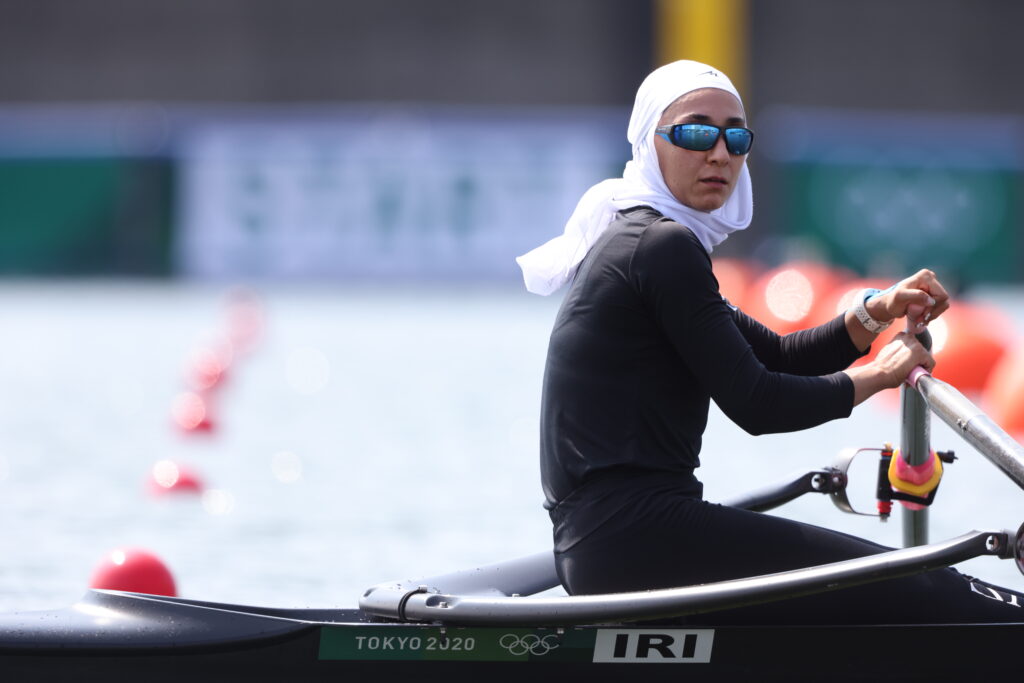
For Heat Two it was Mexico’s Kenia Lechuga that shot out at the start ahead of the World Champion, Sanita Puspure of Ireland. Puspure, 39, is the 2018 and 2019 World Champion but earlier this season finished third at one of the World Cups. Puspure then got ahead of Lechuga with Greece coming through in third. Puspure then started to push away from Lechuga with Kyridou of Greece in third but with Chow of Trinidad and Tobago moving with Kyridou. Chow, 44, is one of the oldest rowers at these Games and she is at her second Olympic Games.
With 500m left the field had become rather spread. Kyridou was now moving out of reach of Chow with Puspure having an open water lead at the head of the field. Lechuga was solidly in second. The order did not change at the line with Puspure pushing it to the line rating up in the 30s and Lechuga only just holding off Kyridou.
The favourite in Heat Three was the 2021 European Rowing Championship winner Hanna Prakatsen of ROC. Prakatsen comes out of the Russian quad and before that rowed for Belarus. She has had a fabulous 2021 season. But Prakatsen was not dominating at the start with Yan Jiang of China just in the lead. Coming into the second 500, Prakatsen managed to push into the lead. Jiang had no answer as Prakatsen pushed away. Way back in third was Hong Kong’s Wing Yan Winne Hung.
Prakatsen looked relaxed coming into the final 500m as she maintained her lead over China with Hong Kong being overtaken by Puerto Rico. ROC and China then buttoned off in the last 250 with Veronica Toro Arana of Puerto Rico in third.
Who would it be in Heat Four? There was Olympic medallist from the double, Victoria Thornley of Great Britain as well as former World Champion, Jeannine Gmelin of Switzerland. Thornely got out the quickest with Gmelin in second and Lovisa Claesson of Sweden in third. Thornley was still in the lead as they moved through the 750m mark and she was looking smooth and solid. Thornley would have known that Gmelin has a good closing sprint and must have wanted to get an edge. With Claesson in third, these three scullers looked set to take the qualifying spots as they went through the middle of the race. Claesson’s father is an Olympian and 26 years old, Claesson has a lot more rowing ahead of her.
Then Gmelin did a push. But Thornley was keeping an eye on Gmelin and held her off. The order did not change through to the end.
Up next was Heat Five featuring the very experienced Magdalena Lobnig of Austria – two-time world bronze medallist and Carling Zeeman of Canada, a regular World finalist. Lobnig had a great start and so did Namibian Maike Diekmann. This is the first time that Namibia has had a rower at the Olympic Games and Diekmann has been training hard in South Africa in Olympic preparation. Lobnig remained in front going through the second 500 with Diekmann in second and Zeeman, coached by Dick Tonks, in third.
Through the half way point Zeeman looked to be closing on Diekmann who won the African qualification regatta. Zeeman last raced internationally in 2019 when she finished sixth at the World Rowing Championships. Out in front, Lobnig was having a fabulous race. In Lobnig’s last international race she finished fourth at World Cup II. Zeeman then did a push coming into the final sprint. Zeeman was going for it and had overtaken Diekmann and was going after Lobnig. The Austrian had to hold on as Zeeman kept on coming. In the final few strokes both dropped their rating, happy to remain first and second.
Heat Six had former World Champion, from 2014, Emma Twigg of New Zealand in lane five. Twigg last raced internationally in 2019 and with two Olympic fourth-place finishes, Twigg wants to make this regatta hers. Out in the front at the start was the Netherlands’ Sophie Souwer with Twigg. Twigg was the first to the 500m mark with Souwer in second and Serbia’s Jovana Arsic in third.
Souwer swaps in between the quad and the single and she’s married to Italian rower Martino Goretti. She raced in the eight at the Rio Olympics. Twigg was now pushing away from Souwer but not shaking her completely. Arsic was right in the mix in third. In the last 500m Twigg had gained an open water lead, but only just. Twigg kept her pace and moved clean away from the field. Souwer had got ahead of Arsic and the order was decided. Emma Twigg had recorded the fastest qualifying time of 7:35.
Qualifiers: USA, BLR, IRI, IRL, MEX, GRE, ROC, CHN, PUR, GBR, SUI, SWE, AUT, CAN, NAM, NZL, NED, SRB
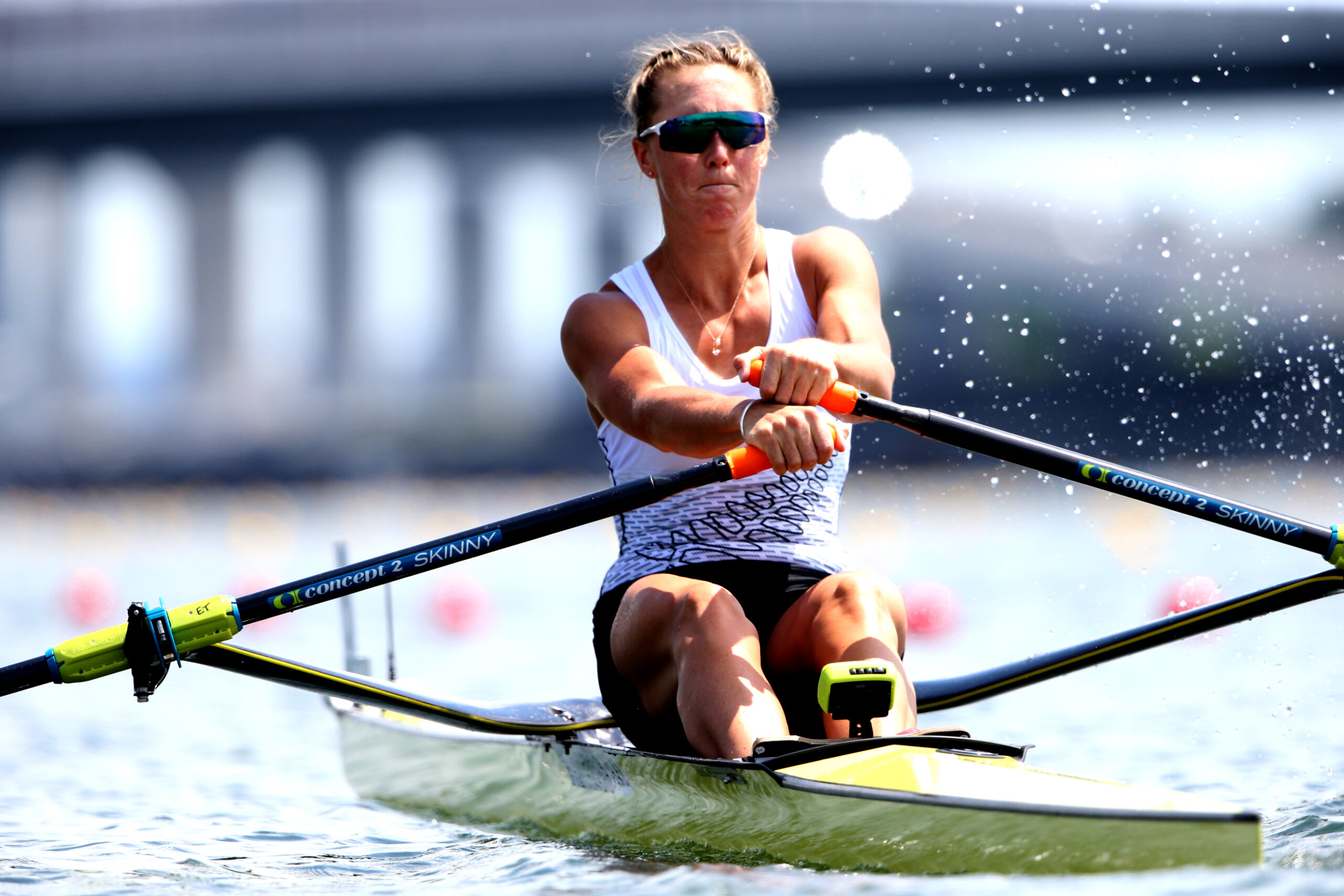
Men’s Double Sculls (M2x) – Heats
The goal here was to be in a top three position for a direct path to the semifinals and in Heat One it was the World Champions, China that everyone was looking at. First to show was France. Boucheron and Androdias of France got to the first 500 ahead of China’s Liu and Zhang in second. Boucheron and Androdias were sixth at the Rio Olympics and they have been training together since. In third was ROC with Germany in fourth and trying to close on ROC. ROC’s Andrey Potapkin and Ioan Prundeanu then closed on China. Nothing looked sorted at this stage. Then Germany looked to drop back a bit as France, China and ROC went through the middle of the race in the three qualifying positions.
China then went to 39 to close on France with France holding them off at 36. The sprint was on to the line. Boucheron and Androdias lifted their stroke rate and held off China. In third was ROC. France had set an Olympic Best Time by a second – 6:10.45.
Heat Two had a fast start with nothing in it at the first 500m. The New Zealand crew had the lead only just followed by Poland and Switzerland. This is a new crew for New Zealand with Chris Harris and Jack Lopas in the boat. Poland’s Miroslaw Zietarski and Mateusz Biskup then got into the lead with all four boats still tightly packed together. The World silver medallists, Ireland, were in fourth. It was oh-so-close though and the middle of the race was yet to come. All boats were going at 19 km/hr which is a great pace. The Olympic Best Time of the last race was under threat.
Ireland was rating 42 and they were on the sprint. They overtook New Zealand as Poland continued to lead. One boat was going to miss out. All boats closed on Poland. It was a photo finish. Phew! Waiting on the times and places. Ireland had missed out. Poland, Switzerland and New Zealand are in the semifinals.
The third and final heat, Heat Three had an even start with the Dutch just a bit ahead. Stefan Broenink is strong on the erg and Melvin Twellaar is young and fast and rowing for the Netherlands they still had the lead. Great Britain was in hot pursuit. Thomas and Collins come out of the quad that medalled in 2017. Twellaar and Broenink continued to lead going under the bridge at the 600m mark with Great Britain in second and Lithuania and Romania going neck-and-neck.
Twellaar and Broenink had now broken clean away from the field. This was quite a contrast to the former heat. This left the real race for second and third as Romania tried to push past Lithuania – the Olympic silver medallists in 2016. Romania had gotten ahead of Lithuania and were closing on Great Britain. Ioan Prundeanu and Marian Enache of Romania had enough water to take Great Britain, the British reacted back and held on to second. But the Netherlands had smashed the Olympic Best Time. The new time – 6:08.30 – two seconds faster than France.
Qualifiers: FRA, CHN, ROC, POL, SUI, NZL, NED, GBR, ROU
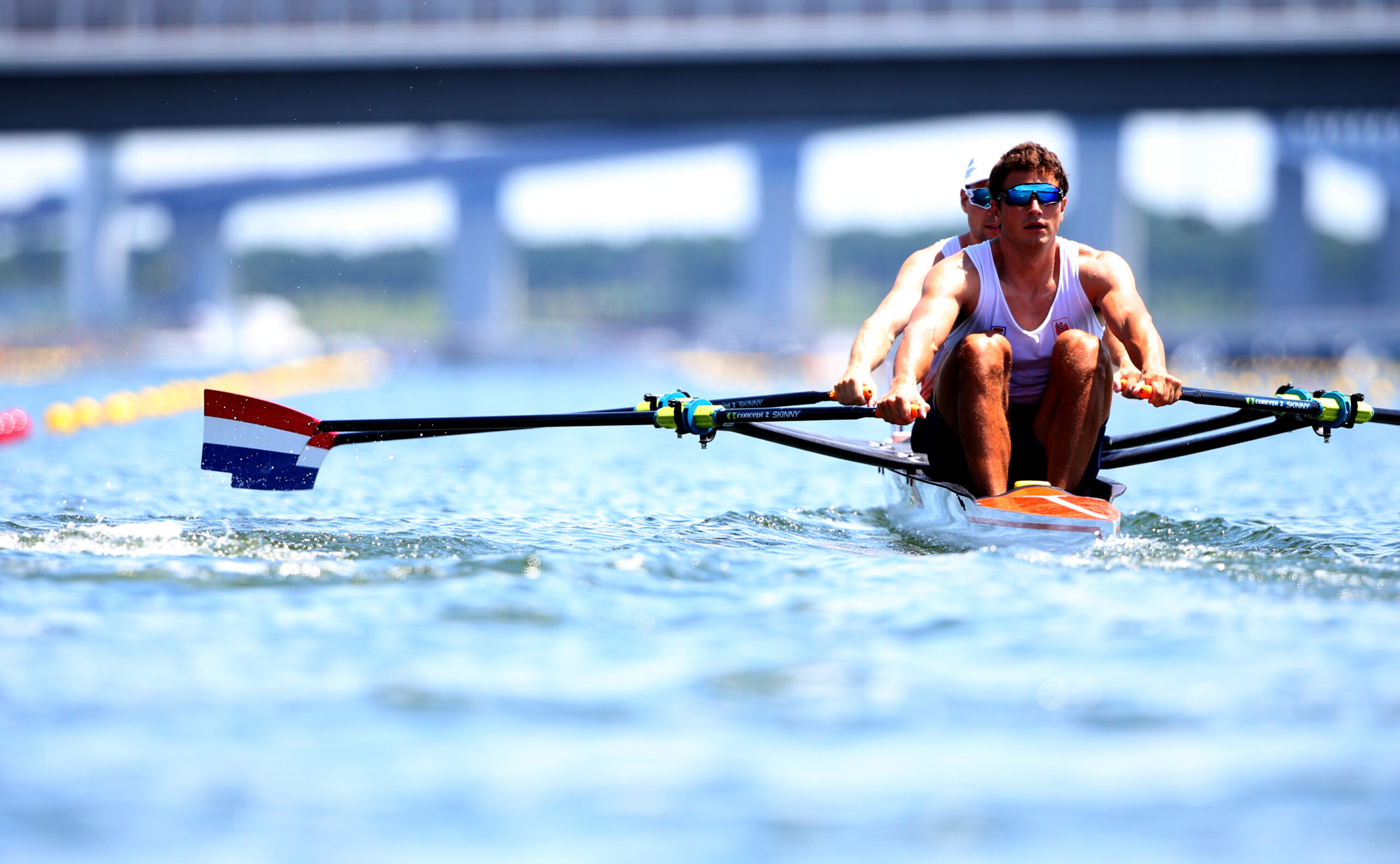
Women’s double sculls (W2x) – Heats
The fastest pace in the start of Heat One was the United States rating 42. These rowers were aiming for a top three place for a direct path to the semifinals. Sitting in the US boat was Gevvie Stone and Kristina Wagner with Stone the Rio Olympic silver medallist from the single. But out in front was China’s Shen and Liu. Then France pushed into the lead with New Zealand now moving into a big piece in the second 500. They rowed through the French and China. Hannah Osborne has come into the New Zealand World Champion boat to join Brooke Donoghue. This is their first international race together and they showed that a slow start doesn’t necessarily matter.
Now the US moved into a piece and had pushed their way through to second ahead of a fading China and France. New Zealand was still moving the quickest as they came into the last 500m. France and the United States were moving together, both going after the second place. In the final sprint Osborne and Donoghue remained in front with the United States grabbing second and France in third.
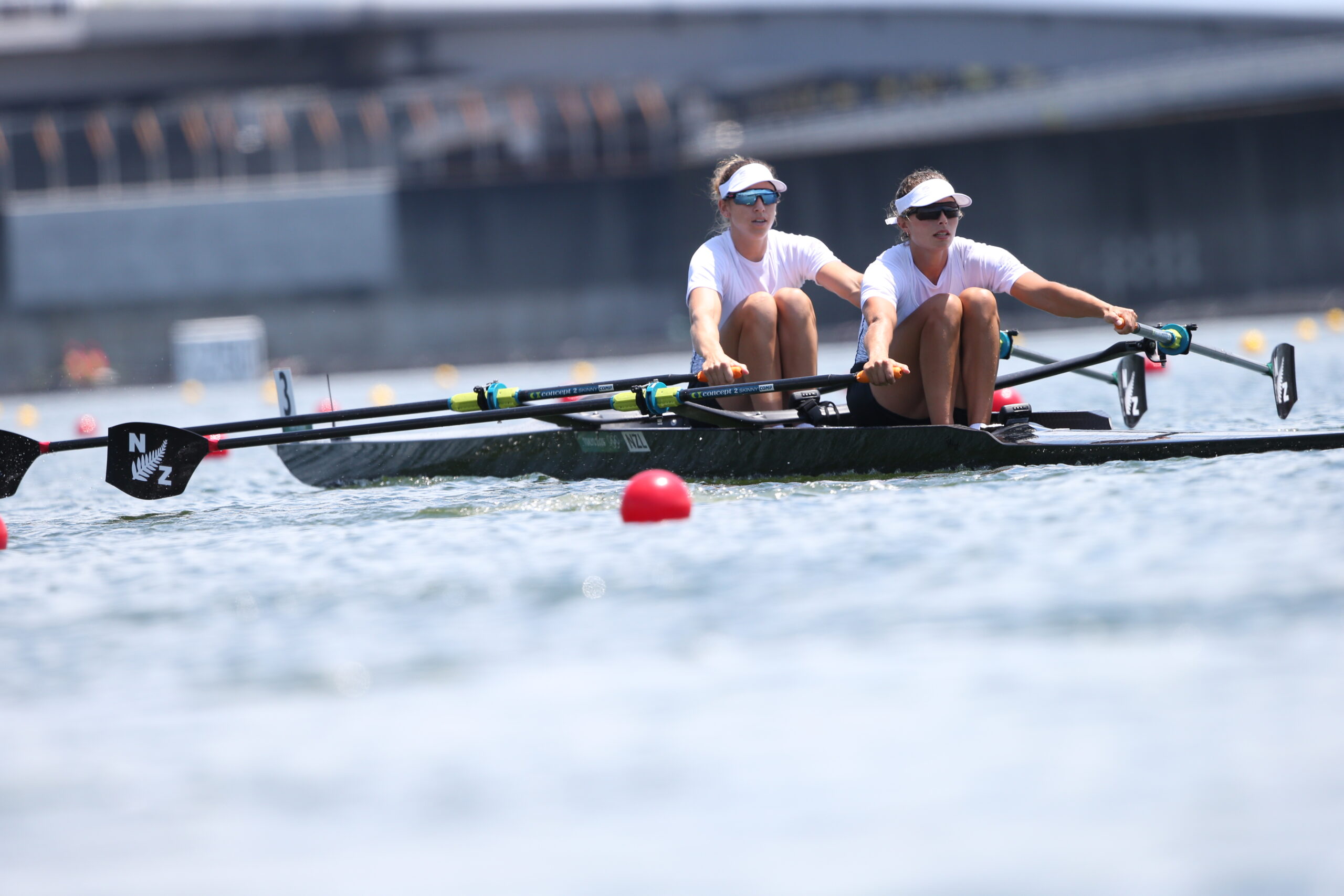
Heat Two had Romania go out the quickest. They finished second at the 2019 Worlds. A virtual line formed behind them as Bodnar and Radis of Romania moved out to an open water lead. At the half way point Bodnar and Radis looked great with Canada just ahead of Italy and ROC in fourth. But those three boats were oh so tight. Gabrielle Smith and Jessica Sevick are racing for the first time together internationally. ROC had now been dropped.
In the final sprint Bodnar and Radis were absolutely in control – 33 metres ahead of Canada. Italy took third.
The final heat, Heat Three was hard to pick. The Netherlands is the 2019 World Champions. Lithuania are the Rio bronze medallists and then there was Australia and Germany featuring Annekatrin Thiele, multiple Olympic medallist. Thiele was racing with Leonie Menzel. Germany had the fastest start before Donata Karaliene and Milda Valciukaite of Lithuania took over in the lead. Karaliene has come back from taking time off after Rio and she now has twin sons in tow. Behind Lithuania a practical line formed. This was going to be a full 2000m race to the end. Germany had now slipped back a bit as the Netherlands moved up on Lithuania with Australia holding on to a qualifying spot ahead of Germany.
With every stroke De Jong and Scheenaard of the Netherlands closed on Lithuania. It was the final quarter of the race and Germany was coming back on Australia as the Netherlands overtook Lithuania. What a finish! At the line the Dutch was first with the German double not quite doing it and will have to go to the repechage.
Qualifiers: NZL, USA, FRA, ROU, CAN, ITA, NED, LTU, AUS
Men’s Quadruple Sculls (M4x) – Heats
This boat class had two heats with a top two finish giving a direct path to the final. In Heat One, the Netherlands is the reigning World Champions and Lithuania has come in at the last minute following the withdrawal of ROC. It was very even at the start with only Lithuania off the pace. The Dutch had the lead with Australia in second and Great Britain and China neck-and-neck.
The Netherlands now had a half boat length lead with Australia just in second and China and Great Britain right there. The Dutch now were powering and had nearly got a boat length over Australia. Great Britain had come through China but would need a big push to get up with Australia. Great Britain weren’t far off but had missed out and will need to row the repechage.
Heat Two got off cleanly and evenly. Italy then got the edge with Poland and Estonia right there. Only Norway and Germany trailing a little. Italy had won World Cup III this year with Norway taking second at that regatta. Poland then got into the lead and looked to be pushing away from Italy. Poland has not had such a good season. They finished fourth at the first and second World Cup this season. Italy tried to hold on to the charging Poles as Estonia remained in third. Estonia has Tonu Endrekson, 42, in the boat. The sprint was on to the line with Italy coming back on Poland. It was a dead heat. There was a wait for the positions. Poland had done it in a time of 5:39.
Qualifiers: NED, AUS, POL, ITA
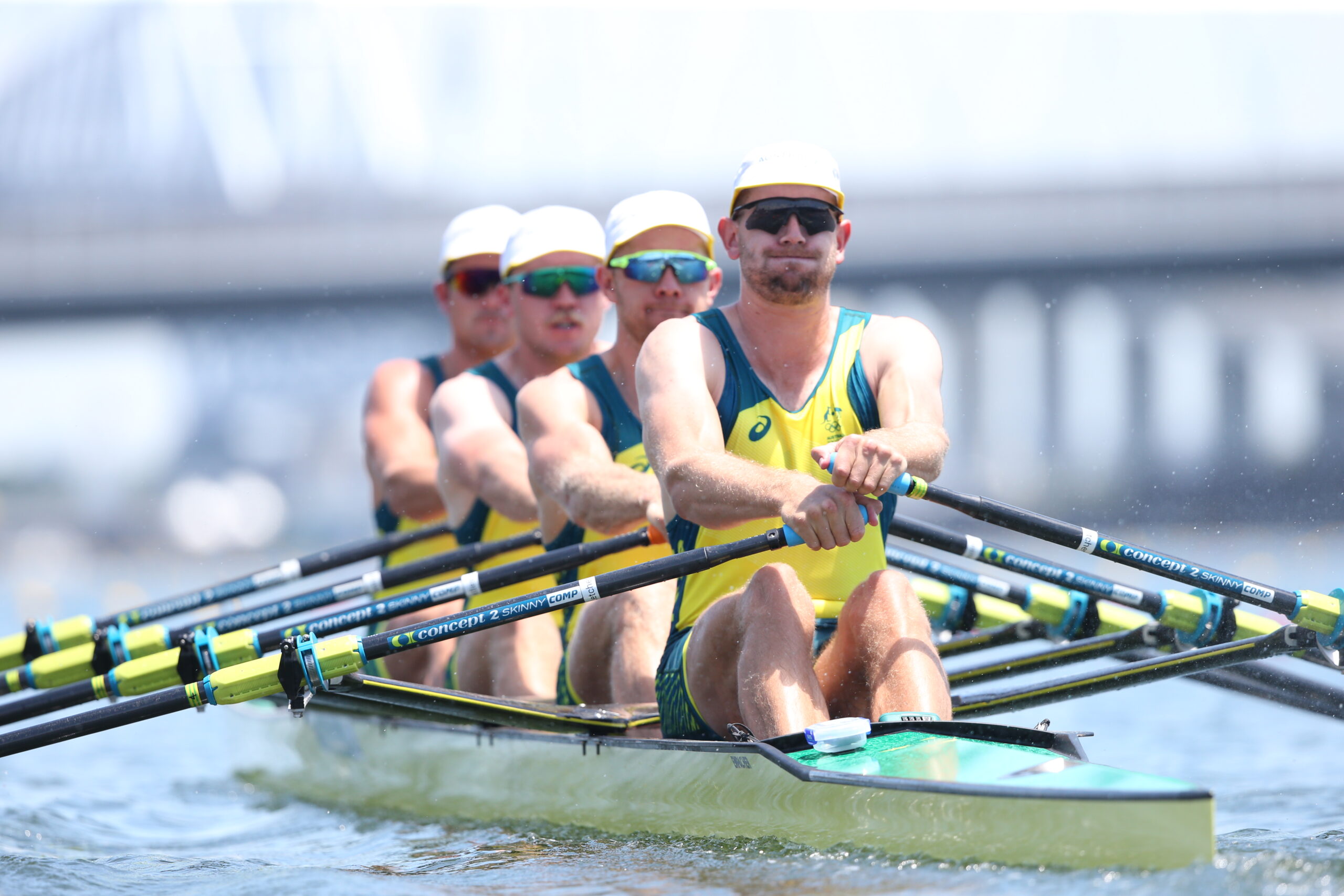
Women’s quadruple sculls (W4x) – Heats
The two heats in this boat class was about finishing in a top two position for a direct path to the final. In Heat One the two-time European Champions, the Netherlands must have been the favourites. The Netherlands was the first to show. They are the bronze medallists from 2019. Germany was holding on to the Dutch and these two boats looked to be pulling away from the pack. They were just over 19 km/hr. Great Britain followed in third with New Zealand next.
Germany then took the lead over the Netherlands as Great Britain went into a piece and were challenging Germany and the Dutch with every stroke. New Zealand remained in fourth and on the pace with the US off the pace at the back of the field. Germany moved into a piece and they remained just in the lead as the Dutch tried to hold off Great Britain. In the final sprint it was neck-and-neck between the Dutch and Germany with Great Britain just a fraction behind. Germany and the Netherlands then really pushed away. The British couldn’t keep up. The two qualifiers had been decided. Germany – Schultze, Kampmann, Nwajide and Haemmerling – had finished first.
The final heat of the day, Heat Two got away cleanly with the 2019 World Champions, China racing. Australia was quick of the start but it was China that soon got into the lead. Already before the first quarter China’s Chen, Zhang, Lyu and Cui had an impressive lead. This was going to be a race for second. China had clean water as they came through the first 500m mark. China finished sixth at the Rio Olympics and they’ve come along in leaps and bounds.
As China moved further away the race for second had Italy and Poland challenging each other. Coming into the final 500 China had a five second lead. Poland was in second with Italy still having time to get into second. Poland remained wary of Italy as they came into the red buoys that marked the last 250m. Poland was second despite Italy putting up a good fight. China had finished in a time of 6:14 – four seconds ahead of Germany in the previous heat.
Qualifiers: GER, NED, CHN, POL

